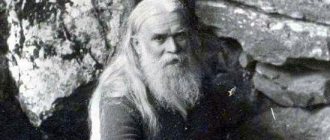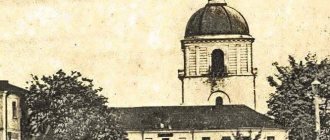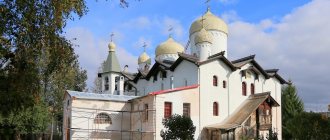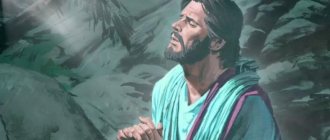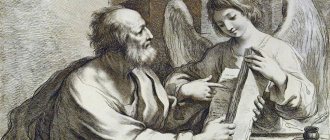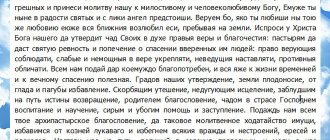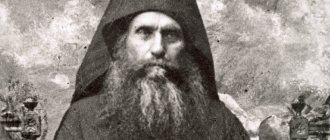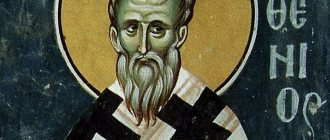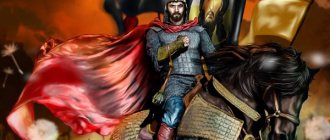Holy Apostle James Zebedee
The Holy Apostle James Zebedee is one of the twelve closest disciples of Christ. He was called to apostolic service together with his brother the Apostle John the Theologian. They, together with the Apostle Peter, became the first witnesses of many miracles performed by Jesus and eyewitnesses of most of the events of the Savior’s earthly life. They were present at the resurrection of Jairus's daughter, saw the Transfiguration of the Lord on Mount Tabor, and were present in the Garden of Gethsemane. After the descent of the Holy Spirit on the apostles, Saint James preached in different countries. According to legend, his opponents hired the philosopher Hermogenes to publicly ridicule and refute the apostle’s arguments. But after hearing Jacob’s speech, first the disciple Hermogenes, and then he himself, received baptism and became Christians. In the forties, the Apostle James returned to Jerusalem. There he was captured and executed by order of King Herod Agrippa. According to one legend, after the martyrdom of the Apostle James, his remains were placed in a boat and launched on the waves of the Mediterranean Sea. Miraculously, this boat sailed to Spain and was thrown ashore at the mouth of the Ulya River. In the ninth century, the ark with the incorruptible relics was found by a hermit monk. A church was built on this site and over time a city appeared. It was named in honor of the Apostle James - in Spanish - Santiago de Compostela.
Russian Orthodox Church
print version
Thursday of the 2nd week of Easter.
30. Thursday of the 2nd week of Easter. Ap. Jacob Zebedee. St. Ignatius Brianchaninov, bishop. Caucasian.
St. Donata, bishop Eury. Finding the relics of St. Nikita, ep. Novgorodsky (service on January 31).
Up service James Zebedee's polyeleos, performed together with the service of the Triodion (A). We also give the procedure for performing the polyeleos service[172] of St. Ignatius Brianchaninov, bishop. Caucasian, in connection with the service of Triodion (B)[173].
A. At Great Vespers
“Blessed is the man” – 1st antiphon.
On “Lord, I cried” stichera for 8: the holiday of Triodion, tone 2 - 3, and the Apostle, tone 4 - 5 (the first two stichera - twice). “Glory” - the apostle, tone 8: “Come, preacher of the Heavenly sacrament...”, “And now” - the holiday of Triodion, tone 4: “O glorious miracle! Lack of faith..."
Entrance. Prokeimenon of the day. Parimia of the Apostle – 3[174].
On the poem are the stichera of the Apostle, tone 8 (with its own refrains)[175]. “Glory” - the apostle, tone 1: “Thou hast followed Christ...”, “And now” - the holiday of Triodion, tone 4: “O glorious miracle! Grass for the fire...” (see in the stichera on the poem).
According to the Trisagion - the troparion of the apostle, tone 3. “Glory, even now” - troparion of the holiday of Triodion (Antipascha), tone 7: “The tomb is sealed...”.
At matins
on “God is the Lord” - the troparion of the holiday of Triodion (Antipascha), tone 7: “The tomb is sealed...” (twice). “Glory” is the troparion of the apostle, tone 3, “And now” is the troparion of the holiday of Triodion (Antipascha), tone 7: “I have sealed the tomb...”.
Kathismas 13th and 14th. Small litanies.
According to the 1st verse - sedalen of the apostle (twice; see, for example, in the General Menaion). “Glory, even now” – sedalny of the holiday of Triodion, tone 1: “Having seen my ribs...” (see in the sedalny on the 2nd verse)[176].
According to the 2nd verse - sedal of the apostle, tone 4: “I beam like the sun...” (twice). “Glory, even now” – sedalny of the holiday of Triodion, tone 1: “Having seen my ribs...” (see in sedalny on the 2nd verse).
Polyeleos. The Greatness of the Apostle and the Selected Psalm. Sedalen of the Apostle in Polyeleos, tone 8: “Dawns from above...” (twice). “Glory, even now” – sedalny of the holiday of Triodion, tone 1: “Having seen my ribs...” (see in sedalny on the 2nd verse). Degree – 1st antiphon of the 4th tone. Prokeimenon of the Apostle, tone 4: “Their message went out into all the earth and their words to the ends of the world”; verse: “The heavens declare the glory of God, but the firmament declares the work of His hand.” The Gospel is the apostle. “Having seen the Resurrection of Christ...” (once). According to Psalm 50: “Glory” - “Through the prayers of the Apostle James...”. Stichera of the Apostle, tone 1: “Thou hast followed Christ...” (see the book of verses on the Vespers verse)[177].
Canons: the holiday of Triodion (Antipascha) with Irmos on 6 (irmos twice) and the Apostle on 8.
Bible songs “We sing to the Lord...”.
Easter Catavasia: “Resurrection Day...”
According to the 3rd song - kontakion and ikos of the holiday of Triodion (Antipascha), tone 8; Sedalen of the Apostle, voice 2 (twice). “Glory, even now” – ipakoi of the Triodion (Antipascha), tone 6: “For in the midst of the disciples...”.
According to the 6th song - kontakion and ikos of the Apostle, tone 2.
On the 9th song we sing “The Most Honest”.
According to the 9th song, “It is worthy to eat” is not sung. The luminary of the Apostle: “Let us sing to James...” (twice). “Glory, even now” is the luminary of the holiday of Triodion (Antipascha; optional).
“Every breath…” and psalms of praise.
On the praises of the stichera for 6: the feast of the Triodion, tone 2 - 3 (see on the Matins verse) [178], and the Apostle, tone 8 - 3 (see on the Vespers verse; without verse refrains). “Glory” - the apostle, tone 6: “The wise is more dexterous...”, “And now” - the holiday of Triodion, tone 4: “O glorious miracle! John in Persian...” (see in praise).
Note.
If the saint is polyeleos (and higher), then on the praises, first the morning stichera are sung on the stichera of the holiday (of this day) on 3, and then the saint on 3 (at the same time, the praise stichera of the day of the Triodion are left). “Glory” - the saint, “And now” - the holiday. The Typikon does not give precise instructions as to which holiday chant to sing on “And Now,” whether from among the praise stichera or from the stichera. You can sing that stichera, from among those of praise, which is printed on “Glory, even now” (cf.: Typikon, chapter 50, “On Monday of the 2nd week of Antipascha at Matins”, 18th “behold”).
Great doxology. According to the Trisagion - the troparion of the apostle, tone 3. “Glory, even now” - troparion of the holiday of Triodion (Antipascha), tone 7: “The tomb is sealed...”.
On the clock
- troparion of the holiday of Triodion (Antipascha). “Glory” is the troparion of the apostle. The Kontakia of the Triodion (Antipascha) and the Apostle's holidays are read alternately.
At the Liturgy
blessed of the holiday of Triodion, hymn 7 - 4 (with Irmos), and the Apostle, hymn 3 - 4.
At the entrance - the troparion of the holiday (Antipascha), the troparion of the temple of the Mother of God or the temple of the saint, the troparion of the apostle; kontakion of the saint's temple. “Glory” is the kontakion of the apostle, “And now” is the kontakion of the holiday (Antipascha). (The troparion and kontakion of the Church of the Lord are not sung; the kontakion of the Church of the Mother of God is not sung.)
Prokeimenon, Alleluia and communion - the holiday of Triodion (Antipascha) and the Apostle.
Apostle and Gospel - the day and the apostle.
Honorer of Easter.
B. At Great Vespers
“Blessed is the man” – 1st antiphon.
On “Lord, I cried” stichera for 8: the holiday of Triodion, tone 2 - 3, and the saint, tone 5 - 5 (the first stichera - twice). “Glory” - the saint, voice 4: “To eternal righteousness...”, “And now” - the holiday of Triodion, the same voice: “O glorious miracle! Lack of faith..."
Entrance. Prokeimenon of the day. Parimia of the saint – 3.
On the stichera are the stichera of the saint, tone 6 (with its own refrains)[179]. “Glory, even now” - the holiday of Triodion, tone 4: “O glorious miracle! Grass for the fire...” (see in the stichera on the poem).
According to the Trisagion - the troparion of the saint, tone 8. “Glory, even now” - troparion of the holiday of Triodion (Antipascha), tone 7: “The tomb is sealed...”.
At matins
on “God is the Lord” - the troparion of the holiday of Triodion (Antipascha), tone 7: “The tomb is sealed...” (twice). “Glory” is the troparion of the saint, tone 8, “And now” is the troparion of the holiday of Triodion (Antipascha), tone 7: “I have sealed the tomb...”.
Kathismas 13th and 14th. Small litanies.
According to the 1st verse – the saint’s sedal, tone 2: “With prayers and sorrows...” (twice). “Glory, even now” – sedalny of the holiday of Triodion, tone 1: “Having seen my ribs...” (see in the sedalny on the 2nd verse)[180].
According to the 2nd verse – the saint’s sedal, tone 8: “Thou art recited, father...” (twice). “Glory, even now” – sedalny of the holiday of Triodion, tone 1: “Having seen my ribs...” (see in sedalny on the 2nd verse).
Polyeleos. The Greatness of the Saint and the Selected Psalm. Sedalen of the saint in polyeleos, tone 5: “Reverend Father...” (twice). “Glory, even now” – sedalny of the holiday of Triodion, tone 1: “Having seen my ribs...” (see in sedalny on the 2nd verse). Degree – 1st antiphon of the 4th tone. The saint's Prokeimenon, tone 4: “My mouth will speak wisdom, and the teaching of my heart will be understanding”; verse: “The mouth of the righteous shall learn wisdom, and his tongue shall speak judgment.” Gospel of the Saint (John, 35 (from half), X, 1–9). “Having seen the Resurrection of Christ...” (once). According to Psalm 50: “Glory” - “Through the prayers of the saint...”. Stichera of the saint, tone 6: “Thou hast known the secret...”.
Canons: the holiday of Triodion (Antipascha) with Irmos on 6 (irmos twice) and the saint’s on 8.
Bible songs “We sing to the Lord...”.
Easter Catavasia: “Resurrection Day...”
According to the 3rd song - kontakion and ikos of the holiday of Triodion (Antipascha), tone 8; Sedal of the saint, tone 3 (twice). “Glory, even now” – ipakoi of the Triodion (Antipascha), tone 6: “For in the midst of the disciples...”.
According to the 6th canto – kontakion and ikos of the saint, tone 8.
On the 9th song we sing “The Most Honest”.
According to the 9th song, “It is worthy to eat” is not sung. The luminary of the saint: “The name of the Most Glorious God-Bearer...” (twice). “Glory, even now” is the luminary of the holiday of Triodion (Antipascha; optional).
“Every breath…” and psalms of praise.
On the praises of the stichera for 6: the Feast of Triodion, tone 2 - 3 (see on the Matins verse) [181], and the saint, tone 8 - 3. “Glory, and now” - the Feast of Triodion, tone 4 : “Oh, a glorious miracle! John in Persian...” (see in praise).
Note.
If the saint is polyeleos (and higher), then on the praises, first the morning stichera are sung on the stichera of the holiday (of this day) on 3, and then the saint on 3 (at the same time, the praise stichera of the day of the Triodion are left). “Glory” - the saint, “And now” - the holiday. The Typikon does not give precise instructions as to which holiday chant to sing on “And Now,” whether from among the praise stichera or from the stichera. You can sing that stichera, from among those of praise, which is printed on “Glory, even now” (cf.: Typikon, chapter 50, “On Monday of the 2nd week of Antipascha at Matins”, 18th “behold”).
Great doxology. According to the Trisagion - the troparion of the saint, tone 8. “Glory, even now” - troparion of the holiday of Triodion (Antipascha), tone 7: “The tomb is sealed...”.
On the clock
- troparion of the holiday of Triodion (Antipascha). “Glory” is the saint’s troparion. The kontakia of the holiday of Triodion (Antipascha) and the saint's day are read alternately.
At the Liturgy
blessed of the feast of Triodion, hymn 7 - 4 (with Irmos), and the saint, hymn 3 (or 6) [182] - 4.
At the entrance - the troparion of the holiday (Antipascha), the troparion of the temple of the Mother of God or the temple of the saint, the troparion of the saint; kontakion of the saint's temple. “Glory” is the kontakion of the saint, “And now” is the kontakion of the holiday (Antipascha). (The troparion and kontakion of the Church of the Lord are not sung; the kontakion of the Church of the Mother of God is not sung.)
Prokeimenon, alleluia and communion - the holiday of Triodion (Antipascha) and the saint (general).
The Apostle and the Gospel - the day and the saint (general: Heb., 318 ch., VII, 26 - VIII, 2. John, 36 ch., X, 9-16).
Honorer of Easter.
172 See: Menaion-April. Part 2. M., 2002. pp. 381–393. 173 Service ap. James Zebedee in this case may be transferred at the discretion of the rector. 174 According to tradition, the New Testament parimia is read with the royal doors open. 175 The verse stichera of the Triodion, which belong to the Octoechos system, are not sung at all in this case. 176 The Sedal Triodi according to the 1st verse, belonging to the Octoechos system, are omitted in this case. 177 Wed: Typicon, April 30; Minea-April. Kyiv, 1893. L. 147. 178 The laudatory stichera of the Triodion, belonging to the Octoechos system, are omitted in this case. 179 The verse stichera of the Triodion, which belong to the Octoechos system, are not sung at all in this case. 180 The Sedal Triodi according to the 1st verse, belonging to the Octoechos system, are omitted in this case. 181 The laudatory stichera of the Triodion, belonging to the Octoechos system, are omitted in this case. 182 Compare: Rozanov V. Liturgical Charter of the Orthodox Church. P. 719.
← previous day next day →
Saint Nikita, Bishop of Novgorod
Saint Nikita, Bishop of Novgorod, lived in the eleventh century. He was born in Kyiv and early took monastic vows at the Kiev Pechersk Lavra. Despite the objections of the abbot, Nikita decided on a feat beyond his strength and spiritual experience and went into seclusion. One day, a certain radiant guest appeared to the young hermit, whom Nikita mistook for an angel. He convinced Nikita that he was already wise enough to give up prayer and start teaching others. The young monk suddenly began to prophesy and quote the Old Testament by heart. Only he refused to study and read the Gospel. Experienced monks were wary of this change. The Kiev-Pechersk elders gathered around Nikita and prayed for a long time. They witnessed how the power of prayer drove out his guest, who turned out to be a demon, from the young monk. Nikita woke up unconscious and at first even forgot his diploma. His further life was an example of obedience and humility. Later he was installed as a bishop in Novgorod. Once, during a drought, through the prayer of Bishop Nikita, rain began, and another time, the city fire stopped.
Today the Church remembers the discovery of the relics of St. Nikita in the year one thousand five hundred and fifty-eight. The shrine rests in the St. Sophia Cathedral.
What prayers should you read at home on the Presentation of the Lord?
If you don’t plan to go to church, then you should read your prayers at home. However, there is a strict order of actions and prayers that should be followed in this case:
- Repent and ask for forgiveness for all your sins;
- Say words of gratitude to the Lord for what you have;
- Read prayers for prosperity, health and happiness with a pure heart and with good thoughts;
- Ask not only for yourself, but also for your loved ones;
- Do not forget to remember with prayer your loved ones who have already left this world.
Saint Ignatius Brianchaninov
Saint Ignatius Brianchaninov, in the world - Demetrius, was born in the year one thousand eight hundred and seven in the Vologda province. He came from an old noble family. At the age of fifteen, the boy was sent to St. Petersburg, to the Military Engineering School. But even then he expressed to his father his desire to become a monk. He completed his studies with flying colors and discovered an extraordinary literary talent. At the school, Brianchaninov became the head of the circle of “admirers of holiness and honor.” At twenty-four, he fulfilled his dream and took monastic vows. Soon he became an archimandrite, rector of the St. Sergius Monastery, and then dean of the monasteries of the St. Petersburg diocese. Ignatius was distinguished by insight, introspection, nobility and spirituality. This attracted him as a large flock. He was well known and appreciated by Metropolitan of Moscow Filaret Drozdov. Gogol, Dostoevsky, the poet Pleshcheev, and Admiral Nakhimov valued their acquaintance with Archimandrite Ignatius. Admired by the personality of Ignatius, Leskov dedicated his story “Unmercenary Engineers” to him. For almost four years, Ignatius, in the rank of bishop, headed the Caucasian and Black Sea diocese with a see in Stavropol. In the sixty-first year, due to health reasons, he retired and devoted the rest of his life to writing spiritual works. The theological heritage of St. Ignatius is still in demand today.
The essence of Eid al-Adha
In addition to general traditions, a number of rules should be followed during the celebration of Eid al-Adha.
Preparations for the holiday begin the day before. Believers clean the house and yard and prepare festive dishes. Before the holiday, Muslims perform a complete ablution, put on their best clothes and go to visit relatives (including the graves of the deceased) and friends, giving them gifts, smiles and congratulations.
Collective prayer usually takes place not only in mosques, but also in the courtyards in front of them, and sometimes in large squares in the city center. The holiday prayer ends with an appeal to Allah, when the imam asks the Almighty to forgive sins and send blessings.
After the prayer, believers go to their homes, where tables with food and drinks are already waiting for them. There are no separate guidelines or rules that govern the holiday menu. But it is believed that on Eid al-Adha it is customary to prepare your best dishes. It goes without saying that the ban on non-halal food, such as pork, still applies. Alcohol is also completely prohibited for a Muslim believer.
Saint Donatus, Bishop of Europe
According to legend, not far from Evria there was a poisoned source of water. Bishop Donatus and other priests prayed at the spring and drove out a huge snake from it. The bishop blessed the water and boldly drank it without any harm. Saint Donatus lived in the fourth century. He was the bishop of the city of Euria, in the region of Epirus, in northwestern Greece.
Another time, through Donat’s prayer, a spring began to flow in a dry, rocky place. They also tell how Bishop Donatus, during a drought, asked the Lord for rain. Crops were saved and people were saved from hunger.
Another miracle of Bishop Donatus is also known. One man repaid his debt shortly before his death.
His death was sudden and unexpected. The lender decided to cheat and again began to demand money from the widow, claiming that he had received nothing from the deceased. Bishop Donatus resurrected the deceased and he confirmed the repayment of the debt.
Holiday traditions
Many traditions have developed around Eid al-Adha. Thus, believers congratulate each other with the famous expression “Eid Mubarak!”, which translated means “I wish you a blessed holiday!” A very important tradition is the payment of special alms - Zakat al-Fitr. This can be either food or money, which the Muslim community sends to the most disadvantaged people in the same area - the sick, the poor, and also those who find themselves in difficult life situations.
Perhaps the most important symbol of Eid al-Fitr is a crowded table. After a long and very difficult fast, during which Muslims refused food and water, they are given the chance to eat and drink whatever they want, whenever they want. Of course, excluding non-halal foods and alcohol prohibited in Islam. But you can start eating only after collective prayer - Eid prayer.
Prayer to the twelve apostles for the fulfillment of a wish
Holy, glorious and all-praised Apostles, the chief Bishop of our confession, Jesus Christ, the election of the disciple and the builder of His mysteries: Peter and Paul, James and John, Andrew and Matthew, Philip and Bartholomew, Thomas and James, Judas and Simon, pray to Christ God, yes from this world he will be worthy to remain in His kingdom, from the son of disobedience he will create me the son of salvation, and I, too, will put off the old man and put on the new man, created by God in righteousness, honor and truth, and I, in righteousness, for sin’s sake, am hated, He will love and create an abode in me, His unworthy servant, worthy of Himself, so that, walking in the rightness of faith, I will reach the Heavenly Father for the inheritance of eternal dignity and there, even here by faith, I will see more clearly in glory and glorify the Holy Trinity to endless ages. Amen.
Prayer to the 12 apostles for help in studying and learning foreign languages
Lord Jesus Christ, our God, truly dwelt in the hearts of the twelve Apostles, and by the power of the grace of the All-Holy Spirit, who descended in the form of tongues of fire, opened their mouths, so that they began to speak in other languages. Lord Jesus Christ Himself, our God, send down Your Holy Spirit upon us and plant in our hearts His Holy Scripture, which Your most pure hand inscribed on the tablets of the lawgiver Moses, now and ever and unto ages of ages. Amen.
Prayer to the 12 apostles, protecting from troubles and problems
About the saints, the apostles of Christ: Peter and Andrew, James and John, Philip and Bartholomew, Thomas and Matthew, James and Jude, Simon and Matthew! Hear our prayers and sighs, now offered by our contrite hearts, and help us, the servants of God (names), through your all-powerful intercession before the Lord, to get rid of all evil and enemy flattery, and to firmly preserve the Orthodox faith that you have devoted to us, in which your intercession will not hurt us. , we will not be belittled by reprimand, nor by pestilence, nor by any wrath from our Creator, but we will live a peaceful life here and be honored to see good things on the land of the living, glorifying the Father and the Son and the Holy Spirit, the One in the Trinity, glorified and worshiped God, now and ever and ever forever and ever.
Eid al-Fitr 2022 how to celebrate the holiday
Eid al-Adha symbolizes the end of the strictest fast in the month of Ramadan. At this time, devout Muslims are prohibited from consuming food and water during the day. It is allowed to sit down at the table only after sunset. Also prohibited are: sexual relations; smoking and using other substances that cloud the mind; foul language and lies.
4 days before the holiday, housewives begin general cleaning of their homes and utility rooms. When the cleaning is completed, each family member should bathe and put on clean clothes. Before the holiday, Muslims try to decorate their home, buy gifts for relatives and prepare various delicacies.
As evening approaches, the women prepare traditional oriental dishes, and the children then treat their relatives. This is how the exchange of goodies occurs.
Prepare for Uraz in advance. Women prepare delicious dishes for the festive table and pass some of them on to their relatives. Men are required to pay a mandatory payment for everyone living in his house. The amount of alms is determined based on an assessment of the condition of each family, but in 2022 it cannot be less than 100 rubles per person. The largest amount for wealthy Muslims in 2021 is 900 rubles for each family member and servant. This amount is calculated from the cost of dates and raisins.
If a Muslim wife has her own property and is wealthy herself, then she can pay alms for herself.
These funds are used to support poor families.
Before sunrise on May 13, 2022, every Muslim must perform a complete ablution, put on white clothes and go to the mosque for general prayer. All Muslims come to the mosque. You can pray near the mosque, because... Everyone doesn't fit there. The prayer lasts half a day, after which everyone begins to congratulate their neighbors on the coming of the holiday. Then they go home.
Uraza cannot be celebrated only in your home. You are supposed to invite people to your place and visit them yourself. Today the poor and beggars are given alms and engaged in charity work. Every Muslim home and family should have a holiday and smell of delicious dishes. On this day, no one is allowed to remain hungry and sad.
